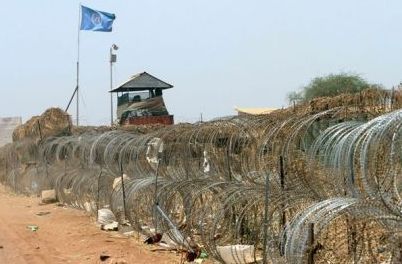UN Abyei peacekeepers reach nearly 3,800 but tension remains
February 9, 2012 (JUBA) – At least 3,798 UN peacekeepers, predominantly members of the Ethiopian Army, have been successfully deployed to the contested region of Abyei which lies on the borders of north and south Sudan, according to a report by the United Nations Secretary General.

This exercise was scheduled to take place concurrently with the South Sudan referendum on independence in January 2011.
But disagreements between Khartoum and Juba over who is eligible to vote led to its indefinite postponement.
In May 2011 – a few days after armed southern elements fired at withdrawing northern troops – the Sudanese Armed Forces (SAF) moved in and seized Abyei forcing thousands of residents to flee the area.
An agreement was reached between the two sides in June of last year, brokered by the African Union High-level Implementation Panel (AUHIP), by which the United Nations would deploy 4,200 peacekeepers from Ethiopia to take charge of the security of the area.
The accord also says armed units from Sudan and South Sudan would withdraw from Abyei.
A 30 September deadline for withdrawal was not met. The Sudanese government made it clear that it will only move out of the area once the full contingent of 4,200 UN Interim Security Force for Abyei (UNISFA) are deployed.
South Sudan blasted Khartoum saying that the latter failed to honor the deal, as there was no mention that the UN deployment had be complete as prerequisite for their withdrawal.
‘PEACEFUL’
Luka Biong Deng, a co-chair of the Abyei Joint Oversight Committee (AJOC), a body created by the last year’s agreement to follow up implementation of the deal between the two parties, said on Monday that the security situation in the area was “relatively peaceful”.
However, a UN report seen by Sudan Tribune on Thursday described the security situation there as “tense and volatile” but added that there were no significant threats to the civilian population in the area.
The report called on the two governments to withdraw their forces from the area and work more closely with AUHIP and UNISFA to find a mutually acceptable solution and implement the agreements.
A meeting of the Joint Political and Security Mechanism (JPSM) on Abyei was due to take place in Addis Abba but was cancelled, in the midst of the oil transer fee standoff between the two countries.
The United Nations Security Council (UNSC) has urged both sides to “to resolve outstanding issues related to finalization of the Safe Demilitarized Border Zone, the resolution of disputed border areas, border demarcation, and the mapping of the border zone.”
As well as Abyei, most of the new international border has not been demarcated. In December UNISFA’s mandate was expanded to include a border-monitoring support role.
The report covering activities of UNISFA last month, called for the deployment of at least two tactical helicopters from Ethiopia as soon as possible and pledged the commitment of the United Nations to carry out disarmament in the area.
“UNISFA would make the arrangements necessary to disarm all nomads and Internally Displaced Persons (IDPS) and would take full responsibility for security”, the report reads.
The report expressed concerns over “long delays” in the issuance of visas by the government of Sudan, saying it hampers the deployment of international staff officers, civilian staff and contractors to the area.
The Secretary General’s report further states that the Sudanese forces are still occupying the area north of the Kiir/Bahr el-Arab River and South Sudan’s forces remain in entire area south of the river.
Over 100,000 were displaced by the conflict last year causing a humanitarian emergency in South Sudan. Since the residents of Abyei, largely from the Dinka Ngok tribe, were forced from the area “large-scale migration of Misseriya” into Abyei has been recorded, the UN report said.
It was Khartoum’s demand that the Arab nomadic group – who enter the area to graze their cattle for a few months of the year – be accorded voting rights in the Abyei plebiscite that was the main factor in it’s postponement.
The report indicates that about 75,000 Misseriya nomads with more than 960,000 cattle were in the Abyei Area in January.
UNISFA say they will make the arrangements necessary to disarm all nomads and displaced persons carrying weapons.
(ST)
